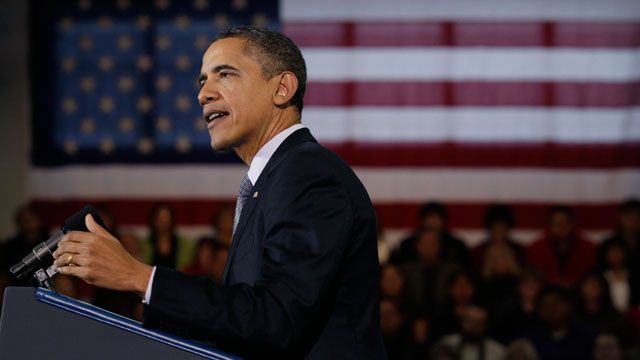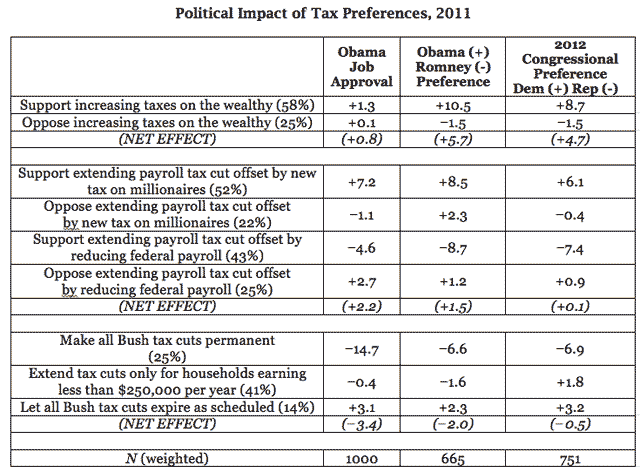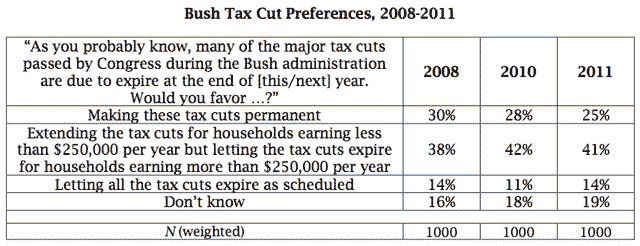The Occupy Wall Street movement has been widely credited with “transforming the national conversation” on matters of economic inequality. Ezra Klein of The Washington Post attributed President Obama’s populist speech on rebuilding the middle class in Osawatomie, Kan., last month “to Occupy Wall Street’s success in turning the national conversation towards inequality,” while Ari Berman of The Nation said it showed “exactly how the Occupy movement has impacted the debate in Washington.”

It is always worth bearing in mind, however, that “the debate in Washington” may be a far cry from a “national conversation.” Significant shifts in attention within the community of political activists and commentators may have little traction among ordinary citizens — or they may escalate public concern without effectively connecting that concern to a concrete policy agenda. Indeed, some observers have pointed to the absence of any clearly articulated policy agenda as a primary failing of the Occupy Wall Street movement.
According to a New York Times report, the president’s speech in Osawatomie was infused with “the moralistic language that has emerged in the Occupy protests around the nation,” but “lacking in specific new policy prescriptions.” Obama defended government activism in general terms, calling for tougher economic regulations and increased investments in education and science; but his most specific policy prescriptions reiterated previous proposals to make the tax system more progressive by letting the Bush tax cuts for high-earners expire and by extending the 2011 payroll tax cut.
A national opinion survey conducted by YouGov one week after the flurry of news coverage of the president’s speech — in the midst of the payroll tax fight in Washington, and after several months of consciousness-raising by the Occupy Wall Street movement — included a variety of questions on these and other aspects of tax policy. Respondents were asked whether they favored or opposed increased taxes on the wealthy, what should happen to the Bush tax cuts, and what they thought of the Democrats’ and Republicans’ competing proposals for extending the payroll tax cut. Taken together, their responses to these questions provide an unusually detailed picture of current public attitudes about progressive taxation.
In general, these responses reveal a good deal of public support for making the federal tax system more progressive. For example, 59 percent of the respondents favored the idea of increasing taxes on the wealthy, while only 25 percent opposed that idea. By a roughly similar margin, 52 to 22 percent, the respondents supported congressional Democrats’ plan to extend the payroll tax cut and offset the cost by imposing a new tax on millionaires. (A smaller plurality supported congressional Republicans’ plan to offset the extension by reducing the federal payroll.)
That sounds like great news for the president and for Americans concerned about escalating economic inequality. The same pattern emerges with respect to an even more momentous issue, the fate of the Bush tax cuts. Those tax cuts reduced federal revenue by almost $3 trillion between 2001 and 2011 — not counting the higher interest payments resulting from the resulting increase in federal debt. In Osawatomie, Obama derided them as “two of the most expensive tax cuts for the wealthy in history,” and repeated his long-standing proposal to restore the Clinton-era tax rates for households earning more than $250,000 per year.
In the December YouGov survey, a solid plurality of respondents (41 percent) favored that proposal. Another 14 percent favored letting all the Bush tax cuts expire; only 25 percent favored the Republican position that all the tax cuts should be made permanent. Thus, on this issue, too, the public is considerably closer to the president than to his Republican opponents. But to what extent, if any, does that reflect Occupy Wall Street’s success in turning the national conversation towards inequality?
As it happens, the same question about the Bush tax cuts was asked in previous YouGov surveys conducted just before the 2008 and 2010 elections. In those surveys, too, a plurality of respondents favored Obama’s proposal to let the tax cuts for top-earners expire. Indeed, the proportion of the public favoring that proposal was one point lower in late 2011 than it had been a year earlier, at the time of the Republicans’ midterm sweep, and only slightly higher than it had been during the 2008 campaign. Moreover, the proportion of survey respondents in 2011 who weren’t sure which option for dealing with the Bush tax cuts they favored was 19 percent, a slightly higher proportion than in 2010 or 2008.
There is remarkably little evidence here that the public as a whole has moved to the left on the most significant policy question currently bearing on the issue of economic inequality — or even that the public has become increasingly engaged in that debate over the past year.
What is even more striking is that President Obama has, at least so far, seemed to benefit remarkably little from being on the popular side of the debate about taxation. For example, citizens who favored increasing taxes on the wealthy — a substantial majority — were only about one percent more likely to approve of the president’s job performance than those who had no opinion on that issue. And those who favored Obama’s long-standing proposal to extend the Bush tax cuts only for households earning less than $250,000 per year — a solid plurality — were slightly less likely to approve of his performance in office, other things being equal. (In contrast, the intense minority of citizens who wanted to make all the Bush tax cuts permanent were almost 15 percent less likely to approve of Obama’s performance.)

The effects of tax preferences on 2012 vote intentions look distinctly more favorable for the president and congressional Democrats. While people who supported the general idea of increasing taxes on the wealthy were only slightly more likely to approve of Obama’s performance as a result, they were substantially more likely to prefer him in a presidential trial heat with Republican Mitt Romney, and substantially more likely to prefer Democrats in 2012 congressional races. Thus, the issue of progressive taxation is likely to advantage Democrats in 2012, at least insofar as it is framed in general terms. However, that may have as much to do with negative perceptions of Romney and congressional Republicans on the issue as with positive enthusiasm for Obama and congressional Democrats.
Moreover, the partisan impact is much less clear on specific policy issues. Although a majority of the public favors the Democratic plan for extending the payroll tax cut, that issue seems to be close to a wash in terms of its likely impact on voters’ choices in the 2012 election. And the issue of what to do about the Bush tax cuts seems likely to hurt Democrats at the polls, despite the fact that their position is most popular with the public — because the minority who want all the Bush tax cuts made permanent seem to be much more likely to base their votes on the issue.
These differences in preference intensity have real political consequences. For example, Democrats could have resolved the fate of the Bush tax cuts in 2010, when they still held majorities in both houses of Congress and the original tax cuts were set to expire. The public as a whole favored the Democratic proposal to let the tax cuts for top earners expire by a solid 42-28 margin in the 2010 YouGov survey (with an additional 11 percent wanting to let all the Bush tax cuts expire). However, congressional Democrats facing tough reelection fights rightly judged that the 28 percent who favored making all the tax cuts permanent were more adamant, more likely to vote, and more likely to vote on the basis of this issue, so they declined to take action. (Both the YouGov survey and exit poll data confirm that judgment.) Instead, in a post-election deal with Republicans, President Obama accepted a two-year extension of all the Bush tax cuts in exchange for a one-year payroll tax cut and an extension of unemployment insurance.
Where will the balance of preference intensity stand later this year, when the Bush tax cuts are once again set to expire? That may be the most important factor in determining whether America makes real progress any time soon in curbing economic inequality. It may also play a role in determining the outcome of the 2012 election. So far, at least, neither the president nor the Occupy Wall Street movement has succeeded in transforming general public support for the principle of progressive taxation into effective support where it counts — at the polls — for the specific policies that are most likely to matter. Until they do, the “national conversation” about inequality is likely to remain all talk and no action.
* * * *
 Larry M. Bartels is the May Werthan Shayne Professor of Public Policy and Social Science at Vanderbilt University and the author of Unequal Democracy: The Political Economy of the New Gilded Age.
Larry M. Bartels is the May Werthan Shayne Professor of Public Policy and Social Science at Vanderbilt University and the author of Unequal Democracy: The Political Economy of the New Gilded Age.


